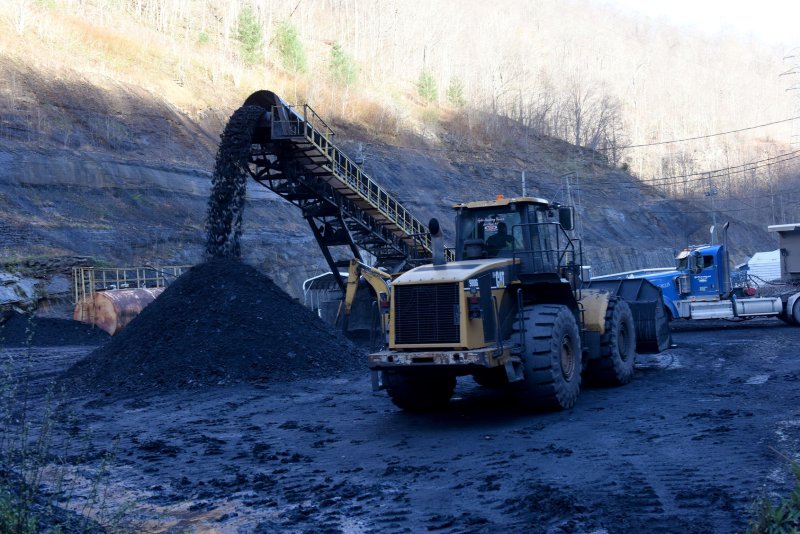U.S. President Donald Trump heads for a rally in coal-rich West Virginia as his EPA readies for a roll back on rules targeting coal as a power source. File Photo by Debbie Hill/ UPI |
License Photo
Aug. 21 (UPI) -- U.S. President Donald Trump on Tuesday said he was eliminating a coal rule that "kills jobs," but climate advocates said it was a step in the wrong direction.
As expected, Trump rolled out his proposed Affordable Clean Energy Rule that would overturn his predecessor's action on cutting emissions from the nation's power sector, if finalized.
"We're ending intrusive EPA regulations that kill jobs," the president said in a statement.
The roll back comes as the president plans to hit the campaign trail to support state Attorney General Patrick Morrisey who is running from a U.S. Senate seat in West Virginia, a major coal-producing state.
For states, acting EPA Administrator Andrew Wheeler said it eliminates federal oversight in a way that would leave room for environmental considerations while at the same time advancing Trump's goal of energy dominance.
"The ACE Rule would restore the rule of law and empower states to reduce greenhouse gas emissions and provide modern, reliable, and affordable energy for all Americans," he said.
Measures outlined by former President Barack Obama mandated cuts in carbon-dioxide emissions from power plants and was a key part of former U.S. commitments to the global Paris climate agreement. The Clean Power Plan, though never enforced, aimed for a 32 percent reduction in the carbon emissions of the nation's power sector.
Trump has been a vocal supporter of the fossil fuels industry. In his inaugural State of the Union address, the president declared an end to the "war on clean coal." Coal accounts for about 30 percent of total energy used globally and about 40 percent of total electricity generation
The Department of Energy in May called on stakeholders to submit information that could support the design and operation of small-scale coal "plants of the future."
The U.S. Energy Information Administration reported that the nation's power sector consumed 661 million short tons of coal last year, the lowest level since 1983.
Hal Quinn, president and CEO of the National Mining Association, said ahead of the EPA proposal that Obama acted illegally by imposing his political agenda on the nation's power sector.
"The replacement rule respects the infrastructure and economic realities that are unique to each state, allowing for state-driven solutions, as intended by the Clean Air Act, rather than top down mandates. It also embraces American innovation, by encouraging plant upgrades," he said in a statement.
But the environmental advocacy group Greenpeace said the Trump administration's move against Obama-era proposals was made out of spite and political in its own right.
"It is a poorly veiled attempt to secure a few votes with a backward-looking policy that could end up costing lives," Janet Redman, a climate campaign director for the group, said in emailed comments. "Trump's allegiance is clear - he's willing to pollute our air and undermine families' health to play the hero for a few coal industry executives."
For producers, the National Rural Electric Cooperative Association, a trade group representing more than 900 local electric cooperatives, said unraveling federal oversight would lead to a bottom-up improvement for the nation's grid.
"This is necessary to provide electric co-ops the certainty and flexibility they need to meet their consumer-members' local energy needs," NRECA CEO Jim Matheson said in a statement.
The support for coal, however, comes amid shifts in the energy landscape. A survey from DNV GL, a Norwegian company providing risk management advice, of 813 senior oil and gas professionals found 64 percent of the sector leaders expected to either increase or sustain spending on natural gas projects this year. Survey results showed that 72 percent of those responding to the survey said coal may become obsolete in the decades ahead.
Christy Goldfuss, senior vice president for energy and environment policy at the Center for American Progress, a left-leaning group, said Trump's move is in support of an industry that's no longer competitive against cleaner fuels.
"It fails to take meaningful action to fight climate change and would actually increase emissions across the country," she said in a statement.
A federal report found total U.S. emissions increased 2.4 percent between 1990 and 2016, but declined 1.9 percent between 2015 and 2016. The government attributed the decline in large part to the decrease in emissions of carbon dioxide, a potent greenhouse gas, which came from substituting coal for natural gas or other non-fossil forms of energy at the nation's power plants.
From a pollution perspective, Robert Howarth, an ecology professor at Cornell University, said letting each state choose its own rules, as the Trump roll back would do, would have complicated problems across state borders. A state like Pennsylvania, with a strong industrial background, would have harmful impacts on New York, which has a greener track record.
"Beyond that, we are in a critical period with regard to addressing climate change," he said in an emailed statement. "We simply must greatly lower emissions of carbon dioxide and methane from energy producers, and do so soon."















